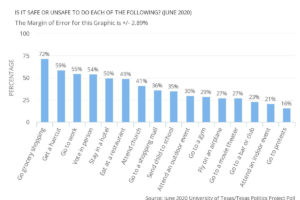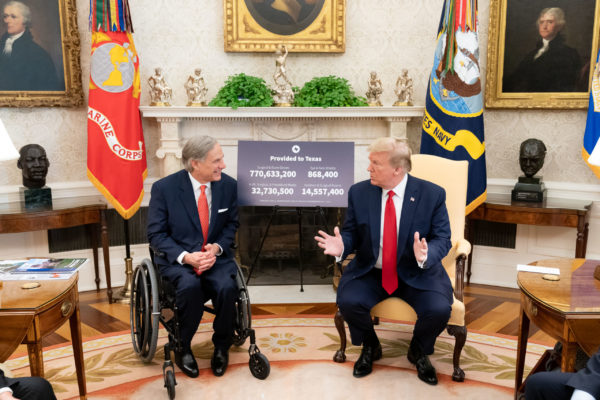AUSTIN, Texas — As the number of reported cases of COVID-19 infections and hospitalizations was increasing in June, Texans expressed less concern about the threat of the virus than they did in April and were much less likely to stay home because of the pandemic, according to polling by the Texas Politics Project at The University of Texas at Austin.
The poll surveyed 1,200 Texans during June 19-29 and compared responses to a set of identical questions asked in an April poll conducted by the same researchers about the pandemic. The results found significant changes in the attitudes and reported behaviors of Texans about the pandemic, including:
- The share of Texans who reported being “extremely” or “very” concerned about the spread of the coronavirus in their community decreased from 54% in April to 47% in June. Those who reported being “not very” or “not at all” concerned about its spread in their community increased from 17% to 26%.
- The share reporting being “extremely” or “very” concerned about either themselves or family members contracting the virus decreased from 54% to 48%, while those who reported being “not very” or “not at all” concerned increased from 17% to 27%.
- The share who reported that they were only leaving their residence when they “absolutely” had to decreased dramatically from 63% to 37%. Those who reported that they were “living normally, coming and going as usual” more than doubled from 9% to 19%.

“Although it’s safe to assume that fatigue with staying at home is a widespread feeling, we saw much larger decreases in concern and reported limiting of public behaviors among Republicans than we did among Democrats,” said James Henson, director of the Texas Politics Project and co-director of the poll. “Mixed messages from national and state leaders about the severity of the virus and its spread have clearly influenced people’s behaviors along partisan lines, with Republicans more open to suggestions from Republican elected officials that we could begin returning to normal without a worsening of the public health situation.”
The poll found that 81% of Texans reported “wearing a mask when in close contact with people outside” their homes, but nearly 1 in 5 Texas voters are not heeding this public health advice, including 31% of Republicans. And while only 7% and 12% of African American and Hispanic/Latinx voters respectively reported not wearing a mask, 25% of white Texans reported not wearing a mask when leaving home.
“Wearing a mask is one of the most basic things people can do to combat the virus without any further restrictions on their behaviors. Unfortunately, it appears as though a significant share of Texans have decided not to adopt the habit,” said Joshua Blank, research director of the Texas Politics Project. “It’s also clear from the data that the choice not to wear a mask isn’t random. Republicans were significantly more likely to skip wearing a mask.”
The poll also asked Texans whether they would participate in different elements of contact tracing, the process of identifying people who may have come into contact with an infected person and the subsequent collection of further information about these contacts.
Many Texans said that they would agree to a mandatory 14-day self-quarantine (76%), provide a list of people that they’ve recently come into contact with (71%), and agree to weekly testing (66%). But only 46% said that they would be willing to provide access to their cellphone location data if they test positive for the coronavirus.
Texans’ evaluation of both national and statewide efforts to fight the virus turned more negative in June. When asked in April how efforts to deal with the coronavirus are going in the U.S., a majority (56%) said that things were going “very” or “somewhat” well, with 40% saying that the efforts were going badly. A majority (51%) now say that things are going badly, with 46% saying that efforts are going well. Similarly, in Texas, 64% of voters said that efforts to fight the coronavirus were going well in April; in June, only 47% agreed.
“The crosscurrents in Texans’ attitudes evident in the poll results illustrate why it has been so difficult to navigate the politics necessary to mount a consistent, sustained response to the pandemic,” Henson said. ”Because basic understandings of the pandemic are increasingly shaped by partisanship, we are in a moment in which large swaths of the public are both critical of the government response and seemingly unwilling to change their own behavior in the name of public health.”
The June 2020 University of Texas/Texas Politics Project poll surveyed Texans on a wide range of topics in addition to the COVID-19 pandemic, including attitudes toward racial discrimination, views of politicking, and the job performance of the state’s political leaders. Results and analysis of the survey data can found on the Texas Politics Project website.




